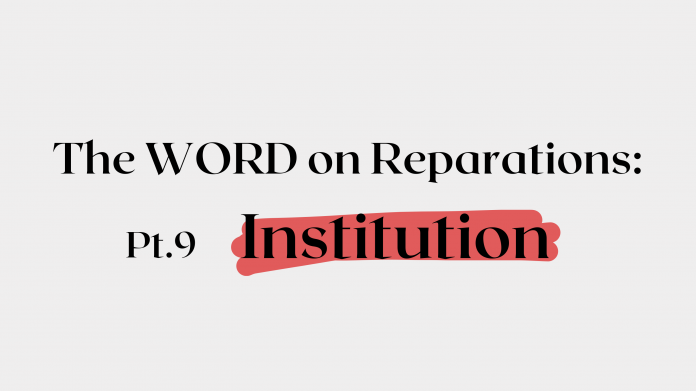Institution. One of the most important aspects of restorative justice work is the ability to be aware of how you engage with affected communities. We are more than just the person: we are the position itself and the institution it serves. We bear the unresolved mistakes of those entities and the negative perceptions that they bring. The past triumphs of our respective positions and the institution may make us stand tall, but we have to acknowledge the looming shadow that our posture casts. We must have the self-awareness to perceive these institutional issues and understand that we are carrying them into every arena, to embrace those hard and uncomfortable truths which we have denied for our gain, not just as a university, but as student organizations too.
That also means we have to assume we don’t have all the answers. We have to listen to the people who live this experience every single day.
I have been in conversations regarding renaming where the crime of chattel slavery was compared to a hypothetical crime of eating meat, and that 50 years from now, we will rename buildings for that reason. How can I have faith in an institution that compares the suffering of people who look like me to eating a hamburger?
Being Black in the United States is a regular, frightening educational and political experience. The fact that we all awaited the verdict of George Floyd’s murderer with bated breath speaks to that.
We have to take our conversations on racism from hushed corners and highly academicized presentations and understand the historical trauma present here. We have to humanize what is typically politicized and made controversial. But that involves humbling ourselves in these conversations to recognize that the only opinions that should carry the greatest amount of influence and weight are those that we have historically ignored.
So when we see letters and posts from a plethora of students about critical Diversity, Equity and Inclusion issues; when we see survey data characterizing an incredibly turbulent experience for diverse students on campus; when we hear about protests happening every month this year and every weekend the semester before, we must go to the communities affected with a desire to learn and listen. Don’t make those who have already fought hard to even be recognized as human at this institution and in this country work harder still to even be heard.
We aren’t the only opinions that matter.
We must acknowledge that and directly go to these communities that have been systematically left out. We can’t say “Black Lives Matter” unless we are actively demonstrating that we care by asking BIPOC students what they need and making those things a reality. We know the dark underscores of history and our involvement within, so we need to authorize the BIPOC community as stakeholders.
One day, hopefully in the near future, it won’t be Black and brown students who suffer due to the negligence of your predecessors. Throughout this conversation, we must build the infrastructure to ensure equity at the College of William and Mary. That means building pathways for students to feel heard and seen.
And in that spirit, I hope you heed my final piece of advice to you, and I wish you luck. Don’t allow the shadow of our past to continue to grow. And when you feel like posting about it or making a one-time donation to BLM, or when you feel the pull to disengage from hard conversations about racism, remember you have that choice; we don’t. The recent deaths of BIPOC people around this country are just flash points in a pandemic of racial hatred that we have helped perpetuate for 329 years, longer than this country has existed. Let’s be deliberate about doing our part to swiftly end that pandemic.
We’ve had no other choice but to respect your time, so please, respect ours.
Anthony Joseph ’21 is majoring in government and global studies. He was the Student Assembly president for the 2020-21 school year. Email Anthony at amjoseph@email.wm.edu.

